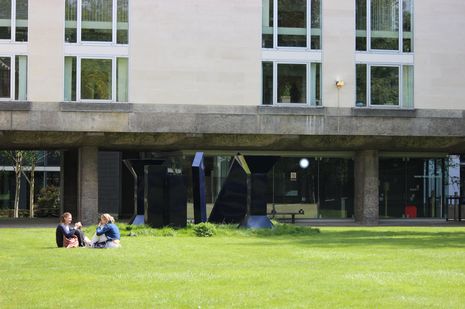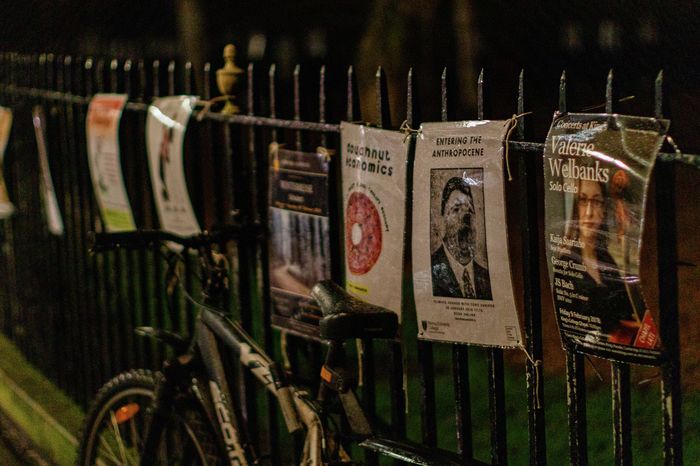Stop disarming people of their nuance
Ben Lubitsh argues that Cambridge students are not always willing to engage in complex debates in an open-minded way

When I first arrived at Cambridge, I assumed that a university celebrated for critical thought would also be a place where complexity could breathe. I expected disagreement, even discomfort. But I didn’t expect the flattening.
I have noticed this ‘flattening’ most explicitly during discussions about Israel-Palestine, which often reveal just how little room there is here for contradiction or nuance. Before any meaningful dialogue can take place, assumptions about one’s background are often treated as declarations of ideology, allowing prejudices to do the talking for us.
But this isn’t really about Israel-Palestine. It’s about a broader culture of discourse at Cambridge – one that increasingly rewards moral certainty and rapid allegiance, and punishes doubt, context, or depth.
“I assumed that Cambridge would be a place where complexity could breathe”
We are being disarmed of our nuance. The result is a political environment that discourages the very habits of thought that a university should protect: curiosity, empathy, and intellectual honesty.
There is something profoundly limiting – even anti-intellectual – about a culture in which complexity is treated as evasion, and moral reflection as weakness. When every issue must be responded to with immediate clarity and total confidence, we turn political discourse into performance. We stop listening to understand and start listening to assess. We stop asking whether people are truly right and start asking merely whether they are on our side.
The incentive, then, is not to think but to signal. Students who might otherwise wrestle openly with an idea instead default to well-rehearsed lines that feel recognisable and unassailable. Conversation becomes about safety – not in the necessary sense of protecting people from harm, but in the reputational sense of avoiding missteps. In that climate, genuine intellectual exploration feels risky.
But what’s truly dangerous is an environment where students begin to believe that being nuanced is being complicit, or that withholding judgment is a moral failing. Critical engagement requires more than taking a stance; it requires listening long enough to understand why others think as they do, and being willing to interrogate your own frameworks in the process.
“We should be modelling how to have difficult conversations, not avoiding them”
When political issues are reduced to binaries, we lose more than just good-faith disagreement. We lose the people whose views don’t fit cleanly into one camp or another – people who might be shaped by painful experiences, inherited identities, or unresolved contradictions. We deny each other the full range of our complexity.
At Cambridge, where intellectual diversity should be a given, this kind of erasure is especially disappointing. We should be modelling how to have difficult conversations, not avoiding them. We should be defending each other’s right to think in drafts – to change our minds, to hold tension, to ask imperfect questions in search of better ones.
That doesn’t mean abandoning principles or tolerating bigotry. It means resisting the instinct to treat all disagreement as betrayal, or all ambiguity as evasion. If we want a politics – and a university culture – that’s genuinely committed to justice and understanding, we have to make space for the slow, often uncomfortable work of grappling with complexity. Dismissing people the moment they fail to echo familiar talking points doesn’t make our positions stronger; it just makes our conversations smaller.
So this is not a call for agreement. It’s not even a call for politeness. It’s a call for intellectual courage – the courage to speak with honesty, to hear with generosity, and to resist the urge to flatten people into positions. Let your peers be complicated. Let yourself be, too.
Because in the end, I know that I speak for many when I say that it would be far more refreshing to be heard in full colour, not black and white.
 News / Colleges charge different rents for the same Castle Street accommodation2 March 2026
News / Colleges charge different rents for the same Castle Street accommodation2 March 2026 News / News in Brief: waterworks, wine woes, and workplace wins 1 March 2026
News / News in Brief: waterworks, wine woes, and workplace wins 1 March 2026 News / Climate activists protest for ‘ethical careers policy’1 March 2026
News / Climate activists protest for ‘ethical careers policy’1 March 2026 News / Angela Merkel among Cambridge honorary degree nominees27 February 2026
News / Angela Merkel among Cambridge honorary degree nominees27 February 2026 News / Private school teacher who lied about Cambridge degree barred from teaching27 February 2026
News / Private school teacher who lied about Cambridge degree barred from teaching27 February 2026









